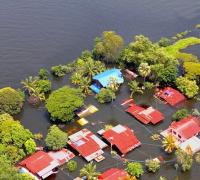Climate politics: Lessons from the frontline
There’s a new frontline in climate politics, and it’s a long way from Paris. It’s playing out between national and local institutions in many rural areas of African countries, where the impacts of climate change are undermining food security and contributing to fragility. These political struggles are not just a local issue: They matter for policies to support resilient development more broadly, and for implementation of the UN Paris Agreement in practice.
This is the context for a new book chapter by Mikkel Funder (DIIS), Carol Mweemba and Imasiku Nyambe (University of Zambia), who draw on research in Zambia on the impacts of climate change adaptation policies. Key points include:
- Globally, local governments and other subnational actors have increasingly come into focus as key players in addressing climate change. This is partly because local governments tend to be the level of government that is most directly confronted with the everyday impacts of climate change, as they are forced to grapple with flooding rivers and drought-stricken voters. More fundamentally, local governments operate in the political space between national governments and communities, thus playing an important, if often ambiguous role as facilitators of national policies and representatives of local citizens.
- In practice, the ability of local governments to act on climate change are often influenced by broader struggles over political authority, resource control and decentralisation. This is also the case in Zambia, where successive national governments have been reluctant to relinquish control to local governments, despite decentralisation policies being in place. Local Governments are therefore considerably constrained in working to help people adapt to climate change and support resilience.
- Despite these constraints, local governments in Zambia do not merely sit back and watch, but engage actively and strategically in adaptation efforts. This provides an important basis for climate adaptation support to build on, and suggests a need to move beyond the common perception of Africa’s rural local governments as passive, incapable and irrelevant. This perception is not only prevalent among national political elites, but also lingers in some climate funds where “thinking big and global” is rarely associated with the everyday mundane work of local governments. Clearly, capacity issues exist in local governments and must be addressed, but the key to doing so is a matter of governance.
- Climate change adaptation can provide a platform for local governments to assert their roles and claims vis-à-vis central governments more broadly. In Zambia, this includes forming new alliances between local governments and civil-society organizations, and staking claims for fiscal devolution and locally anchored natural resource governance. Strengthening subnational climate governance thus potentially has wider-reaching benefits for governance, democratic development and resource distribution.
- Climate agreements and financing mechanisms such as the Green Climate Fund can play a role in this respect by incorporating measures that enhance the downward accountability of national governments and support platforms for local governments, civil society and other actors to counter autocratic approaches to climate change adaptation. Emerging experiences from support to decentralised climate governance and financing in Kenya and Ghana provide initial guidance for the way forward.
Sub-national climate governance is thus not an appendix to the global climate change agreement, but a key condition for its success.
The book chapter is part of a new anthology on Decentralized Governance of Adaptation to Climate Change in Africa.
The research was conducted under the Danida funded Climate Change and Rural Institutions research programme.
DIIS Experts


